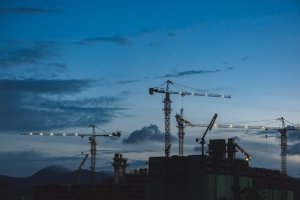- Construction

Shorter Reads
Coronavirus: Open, closed or who knows? Keeping construction sites open amidst lockdown
The current guidance is causing widespread confusion in the construction industry as the decision is effectively being left up to the discretion of those managing the sites. We provide advice on following the government guidelines whilst complying with the terms of construction contracts.
2 minute read
Published 30 March 2020
Key information
- Specialisms
- Real Estate
- Services
- Construction
On the evening of 23 March, the Prime Minister announced a nationwide lockdown in which he instructed everyone to stay at home subject to specific exceptions. One exception was “travelling to and from work, but only where this is absolutely necessary and cannot be done from home”.
In respect of the construction industry, further guidance was provided the following day by Chancellor Rishi Sunak and Minister for the Cabinet Office Michael Gove who both confirmed that construction sites could remain open if done safely and provided that the government guidance on social distancing was adhered to. The Cabinet Minister later went onto remark that:
There are different types of construction. If you’re entering a home where there are already citizens, a family, you should not be doing that. But construction that takes place in the open air on new sites, that is appropriate.
On the morning of 25 March, Housing secretary, Robert Jenrick remarked that there were some functions in the industry that were “absolutely essential” for everyone such as keeping buildings safe, ensuring essential maintenance and carrying out repairs such as removing dangerous cladding off buildings.
Contrary views have been expressed by Jeremy Corbyn and Sadiq Khan who have called for all constructions sites to close.
What can be concluded from the above is that the guidance provided to date is causing widespread confusion in the construction industry as the decision to remain open is, in effect, being left up to the discretion of those managing the sites. These decision makers are being left to determine whether the site should remain open and/or whether the construction work they are carrying out is essential work within the meaning of the guidelines. These issues balanced against the overarching importance of ensuring the health and safety of all staff on every construction site leaves those making the decisions in a precarious position.
The question that must be asked is whether 1) the works are essential and 2) whether it is possible for all staff on site to remain a distance of 2m (6.5ft) from one another? If the answer to both these questions is no, then the site must close.
Regardless of the decision, it is critical for all relevant parties to communicate and document the basis for their decision. The default position in contract law is that a party to a contract is required to comply with its contractual obligations subject to the relief it is afforded under specific contractual provisions as well as the common law.
Whether the COVID-19 pandemic is a force majeure event or whether the government’s guidelines amount to an exercise of statutory power which relieves parties from their obligations under a construction contract will depend on the unique facts of each circumstance. However, just because the government has issued guidelines does not mean the contractual provisions of the contract should be ignored. It is important to clarify the contractual basis in writing for closing a site or continuing works using both clear and concise language so as to confirm the position of all parties. This is especially critical in a rapidly changing landscape where new guidelines could be imposed by the government on short notice.
In the event of site closures and having regard to the uncertainty of how long the lockdown may last, parties should also be alive to the contractual implications of an extended site closure. Most standard form contracts will include a termination provision which is available to either party after a specified time in the event that works are suspended by reason of force majeure or exercise of statutory power. The default time period in JCT provisions is 2 months. If applicable, opening up dialogue should be done as early as possible with all affected parties.
What we can all agree on as that these are unprecedented uncertain times which are rapidly evolving on a daily basis. All that can be done is for all key decision makers on construction sites to use their best efforts to comply with government guidelines whilst also remaining vigilant that they are complying with the terms of construction contracts.
Related content
Shorter Reads
Coronavirus: Open, closed or who knows? Keeping construction sites open amidst lockdown
The current guidance is causing widespread confusion in the construction industry as the decision is effectively being left up to the discretion of those managing the sites. We provide advice on following the government guidelines whilst complying with the terms of construction contracts.
Published 30 March 2020
Associated sectors / services
On the evening of 23 March, the Prime Minister announced a nationwide lockdown in which he instructed everyone to stay at home subject to specific exceptions. One exception was “travelling to and from work, but only where this is absolutely necessary and cannot be done from home”.
In respect of the construction industry, further guidance was provided the following day by Chancellor Rishi Sunak and Minister for the Cabinet Office Michael Gove who both confirmed that construction sites could remain open if done safely and provided that the government guidance on social distancing was adhered to. The Cabinet Minister later went onto remark that:
There are different types of construction. If you’re entering a home where there are already citizens, a family, you should not be doing that. But construction that takes place in the open air on new sites, that is appropriate.
On the morning of 25 March, Housing secretary, Robert Jenrick remarked that there were some functions in the industry that were “absolutely essential” for everyone such as keeping buildings safe, ensuring essential maintenance and carrying out repairs such as removing dangerous cladding off buildings.
Contrary views have been expressed by Jeremy Corbyn and Sadiq Khan who have called for all constructions sites to close.
What can be concluded from the above is that the guidance provided to date is causing widespread confusion in the construction industry as the decision to remain open is, in effect, being left up to the discretion of those managing the sites. These decision makers are being left to determine whether the site should remain open and/or whether the construction work they are carrying out is essential work within the meaning of the guidelines. These issues balanced against the overarching importance of ensuring the health and safety of all staff on every construction site leaves those making the decisions in a precarious position.
The question that must be asked is whether 1) the works are essential and 2) whether it is possible for all staff on site to remain a distance of 2m (6.5ft) from one another? If the answer to both these questions is no, then the site must close.
Regardless of the decision, it is critical for all relevant parties to communicate and document the basis for their decision. The default position in contract law is that a party to a contract is required to comply with its contractual obligations subject to the relief it is afforded under specific contractual provisions as well as the common law.
Whether the COVID-19 pandemic is a force majeure event or whether the government’s guidelines amount to an exercise of statutory power which relieves parties from their obligations under a construction contract will depend on the unique facts of each circumstance. However, just because the government has issued guidelines does not mean the contractual provisions of the contract should be ignored. It is important to clarify the contractual basis in writing for closing a site or continuing works using both clear and concise language so as to confirm the position of all parties. This is especially critical in a rapidly changing landscape where new guidelines could be imposed by the government on short notice.
In the event of site closures and having regard to the uncertainty of how long the lockdown may last, parties should also be alive to the contractual implications of an extended site closure. Most standard form contracts will include a termination provision which is available to either party after a specified time in the event that works are suspended by reason of force majeure or exercise of statutory power. The default time period in JCT provisions is 2 months. If applicable, opening up dialogue should be done as early as possible with all affected parties.
What we can all agree on as that these are unprecedented uncertain times which are rapidly evolving on a daily basis. All that can be done is for all key decision makers on construction sites to use their best efforts to comply with government guidelines whilst also remaining vigilant that they are complying with the terms of construction contracts.
Associated sectors / services
- Construction
Need some more information? Make an enquiry below.
Enjoy reading our articles? why not subscribe to notifications so you’ll never miss one?
Subscribe to our articlesMessage us on WhatsApp (calling not available)
Please note that Collyer Bristow provides this service during office hours for general information and enquiries only and that no legal or other professional advice will be provided over the WhatsApp platform. Please also note that if you choose to use this platform your personal data is likely to be processed outside the UK and EEA, including in the US. Appropriate legal or other professional opinion should be taken before taking or omitting to take any action in respect of any specific problem. Collyer Bristow LLP accepts no liability for any loss or damage which may arise from reliance on information provided. All information will be deleted immediately upon completion of a conversation.
Close





























